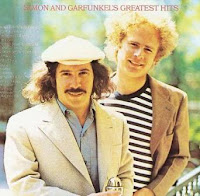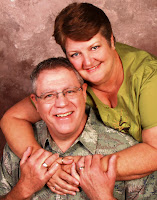 This time of year we often hear the beautiful old song "Silent Night," which speaks of the "heavenly peace" of the night when Jesus was born. As the song continues, it tells of how the silence of that night is shattered, and the witnessing "shepherds quake at the sight" of an angelic choir heralding the birth of Christ. The silence of that night represents peace and calm, but the end of that silence is welcomed because it brings something better.
This time of year we often hear the beautiful old song "Silent Night," which speaks of the "heavenly peace" of the night when Jesus was born. As the song continues, it tells of how the silence of that night is shattered, and the witnessing "shepherds quake at the sight" of an angelic choir heralding the birth of Christ. The silence of that night represents peace and calm, but the end of that silence is welcomed because it brings something better. The classic rock duo Simon and Garfunkel are also famous for a song about silence. However, unlike "Silent Night," which uses silence as a metaphor for peace and well-being, "The Sound of Silence" has a different message. As Art Garfunkel says in the video linked above, the song uses silence to symbolize people's individual inability to communicate with one another, and their failure to love one another. The song uses stark images of a vision the narrator experiences, a vision of city streets, neon lights, and the sound of silence, which, for me, represents the results of love-term isolation:
The classic rock duo Simon and Garfunkel are also famous for a song about silence. However, unlike "Silent Night," which uses silence as a metaphor for peace and well-being, "The Sound of Silence" has a different message. As Art Garfunkel says in the video linked above, the song uses silence to symbolize people's individual inability to communicate with one another, and their failure to love one another. The song uses stark images of a vision the narrator experiences, a vision of city streets, neon lights, and the sound of silence, which, for me, represents the results of love-term isolation:"And in the naked light I saw
Ten thousand people, maybe more.
People talking without speaking,
People hearing without listening,
People writing songs that voices never share
And no one dared
Disturb the sound of silence."
 People not communicating. People not relating to one another. People ignoring one another. People going through the motions of interacting without really knowing each other. People not having the courage to end their isolation. Although Paul Simon wrote "The Sound of Silence" in 1964, its message is perhaps more relevant than ever. A 2009 article from Psychology Today calls social isolation a modern plague: "Remarkably, 25% of Americans have no meaningful social support at all - not a single person they can confide in. And over half of all Americans report having no close confidants or friends outside their immediate family. The situation today is much worse today than it was when similar data were gathered in 1985. (At that time, only 10% of Americans were completely alone)." Consumer Reports from 2010 says that such isolation is not only bad for a person, but can actually shorten one's life.
People not communicating. People not relating to one another. People ignoring one another. People going through the motions of interacting without really knowing each other. People not having the courage to end their isolation. Although Paul Simon wrote "The Sound of Silence" in 1964, its message is perhaps more relevant than ever. A 2009 article from Psychology Today calls social isolation a modern plague: "Remarkably, 25% of Americans have no meaningful social support at all - not a single person they can confide in. And over half of all Americans report having no close confidants or friends outside their immediate family. The situation today is much worse today than it was when similar data were gathered in 1985. (At that time, only 10% of Americans were completely alone)." Consumer Reports from 2010 says that such isolation is not only bad for a person, but can actually shorten one's life.  To personalize this topic, I know that my wife Dana and I are somewhat isolated from people outside our extended family. We work. We come home. We are tired. We are both introverts and we tend to be a bit anti-social (keeping it real!), so we don't socialize much (except on Facebook). Very little. Hardly ever. Most of the people in our neighborhood are just like us, so we haven't had much interaction with them, either. For the most part, we have been fine with this state of things, each of us being content with the company of the other, occasional visits with our children and grandchildren, who live out of state, and with my mother and Dana's brother and sister-in-law, who are local.
To personalize this topic, I know that my wife Dana and I are somewhat isolated from people outside our extended family. We work. We come home. We are tired. We are both introverts and we tend to be a bit anti-social (keeping it real!), so we don't socialize much (except on Facebook). Very little. Hardly ever. Most of the people in our neighborhood are just like us, so we haven't had much interaction with them, either. For the most part, we have been fine with this state of things, each of us being content with the company of the other, occasional visits with our children and grandchildren, who live out of state, and with my mother and Dana's brother and sister-in-law, who are local. Usually, Dana and I are fine with this arrangement. I sometimes wish we had a more active social life, but I haven't done much to change it. I just chock it up to people being busy and the state of our society. Instead of front porches and "y'all come" attitudes, most folks today, including us, have patios out back with privacy fences and "please call first" attitudes. When I was a kid growing up, we had stay-at-home moms and neighbors who knew one another and helped each other out. Now many people value their privacy over a feeling of community. When they aren't working, they mostly want to be left alone. They don't want to be bothered and they don't want to bother anyone else. I am convinced we are paying a price for these attitudes.
 My attitude about how much community I need was changed drastically last Thanksgiving night. Dana and I were at our daughter's house (380 miles from home), and, having enjoyed the holiday with her and her family, we were sleeping when my cell phone rang a little after midnight. It was my home security company: "Mr. Fouse, we have movement in your house." They went on to inform me that the police were on their way. I could not believe what I was hearing! I reacted physically by beginning to shake. I kept saying how cold I was, but Dana (an RN) later told me that I was experiencing a rush of adrenalin. What do you do when there are thieves in your house and you are 5 hours away? I eventually spoke to the policeman who was in my house responding to the call from the security company. He told me that the burglars had thrown a rock through the glass patio door in our bedroom and entered there. When I told him I was facing a long drive home, he asked me if I could call someone to secure my house. That was an excellent question. My mother was out of town for the holiday also, so I couldn't call her. Being Mr. Independent, I hate to ask anybody for help. But, in this case, I had no choice. So, I called my neighbor Wayne.
My attitude about how much community I need was changed drastically last Thanksgiving night. Dana and I were at our daughter's house (380 miles from home), and, having enjoyed the holiday with her and her family, we were sleeping when my cell phone rang a little after midnight. It was my home security company: "Mr. Fouse, we have movement in your house." They went on to inform me that the police were on their way. I could not believe what I was hearing! I reacted physically by beginning to shake. I kept saying how cold I was, but Dana (an RN) later told me that I was experiencing a rush of adrenalin. What do you do when there are thieves in your house and you are 5 hours away? I eventually spoke to the policeman who was in my house responding to the call from the security company. He told me that the burglars had thrown a rock through the glass patio door in our bedroom and entered there. When I told him I was facing a long drive home, he asked me if I could call someone to secure my house. That was an excellent question. My mother was out of town for the holiday also, so I couldn't call her. Being Mr. Independent, I hate to ask anybody for help. But, in this case, I had no choice. So, I called my neighbor Wayne. Wayne is my neighbor to the east, and he has always been a better neighbor to me than I have been to him. He is retired and has lots of time to visit with neighbors. He is friendly and outgoing, but not pushy. Remember Tim Taylor's neighbor Wilson on Tool Time? That's my neighbor Wayne. Except that I have actually seen his face He had offered to help with things around the house a few times, so I knew he was the one to call, as much as I hated to. I found his number on the internet and called his house. When he answered, I told him I was sorry to wake him, to bother him at that hour. He said he didn't mind, that my alarm had awoken him earlier. He told me he had been outside when the alarm went off, but he hadn't seen anyone. There wasn't any way he could secure my house with a gaping hole in the door, but he promised to keep an eye on it until I could get home. Talking to Wayne calmed me greatly. Just knowing there was someone friendly here made the situation seem less dire.
Wayne is my neighbor to the east, and he has always been a better neighbor to me than I have been to him. He is retired and has lots of time to visit with neighbors. He is friendly and outgoing, but not pushy. Remember Tim Taylor's neighbor Wilson on Tool Time? That's my neighbor Wayne. Except that I have actually seen his face He had offered to help with things around the house a few times, so I knew he was the one to call, as much as I hated to. I found his number on the internet and called his house. When he answered, I told him I was sorry to wake him, to bother him at that hour. He said he didn't mind, that my alarm had awoken him earlier. He told me he had been outside when the alarm went off, but he hadn't seen anyone. There wasn't any way he could secure my house with a gaping hole in the door, but he promised to keep an eye on it until I could get home. Talking to Wayne calmed me greatly. Just knowing there was someone friendly here made the situation seem less dire. Dana and I drove all night and made it home about 7:30 the next morning. Not much was gone, but our sense of safety had been shattered along with that glass door. When the police arrive later, Wayne talked to them, and commiserated with us. Richard, my neighbor on the west, came out and said that he had also heard my alarm. He helped the police locate some items that were stolen from my mailbox, items that the police used to try to get the culprits' fingerprints. When I brought home the replacement door from Lowe's the men who live across the street helped me move it into the house.
Simon and Garfunkel have another song about isolation. Long one of my favorites by them," I Am a Rock" is about the ultimate anti-social person, who proclaims, "I am a rock; I am an island. I build walls, their fortress deep and mighty, that none may penetrate...." Many people today, although they might not overtly express those ideas, live them out in their lives. I know that I have been prone to self-imposed isolation, although not to the extent of the Rock in the song. Cutting yourself off from those around you becomes a habit, a way of living that is hard to overcome. I have come to realize that, as "The Sound of Silence" puts it, "silence like a cancer grows."
However, my experience with the burglary taught me some things relating to our places in society, and about myself.
First, whether we know it or not, we are part of a community. My neighbors are part of my community, and I am part of theirs, even I don't know them well or rarely speak to them. I know that because I realized that morning when the police were at my house that Dana and I weren't the only victims of that burglary. When my security was breached, theirs was also. When my alarm sounded and woke them up, their silence, their peace was shattered, too. Because if my house could be violated, theirs could too. If hoodlums could destroy my property and steal my possessions, it could happen to them to. Indeed, in a way, it did happen to them.
 Secondly, no matter how independent I prefer to be, I really do need people -- for practical things like helping me carry heavy objects, and for emotional support, like a friendly voice on the phone when I am facing a crisis. Like it or not, I need other people, just like they need me.
Secondly, no matter how independent I prefer to be, I really do need people -- for practical things like helping me carry heavy objects, and for emotional support, like a friendly voice on the phone when I am facing a crisis. Like it or not, I need other people, just like they need me.So, what am I going to do about what I have learned? I know that I am not going to become an extrovert, but I do intend to be more open to being in community with people, to whatever extent our relationship calls for. I want to look for ways to be more sociable, to reach out to people. Writing this blog has taught me that when I am honest about myself, even just in a blog, when I talk openly about things that matter to me, things that might make me feel vulnerable, I give other people permission to do the same. I want to do that more in my real-world interactions with people as well.
About a week after I was burglarized, Wayne was out front when I came home from work. He and I visited on the curb for several minutes, talking about the burglary and about our families. Before he left to go in, he told me that he would like to give me a key to his house, and to let me know when he was going to be out of town. He asked me to watch his house during those times. I told him I'd be glad to and asked him to do the same for me. He said he'd be glad to.
I guess that's a start.


























